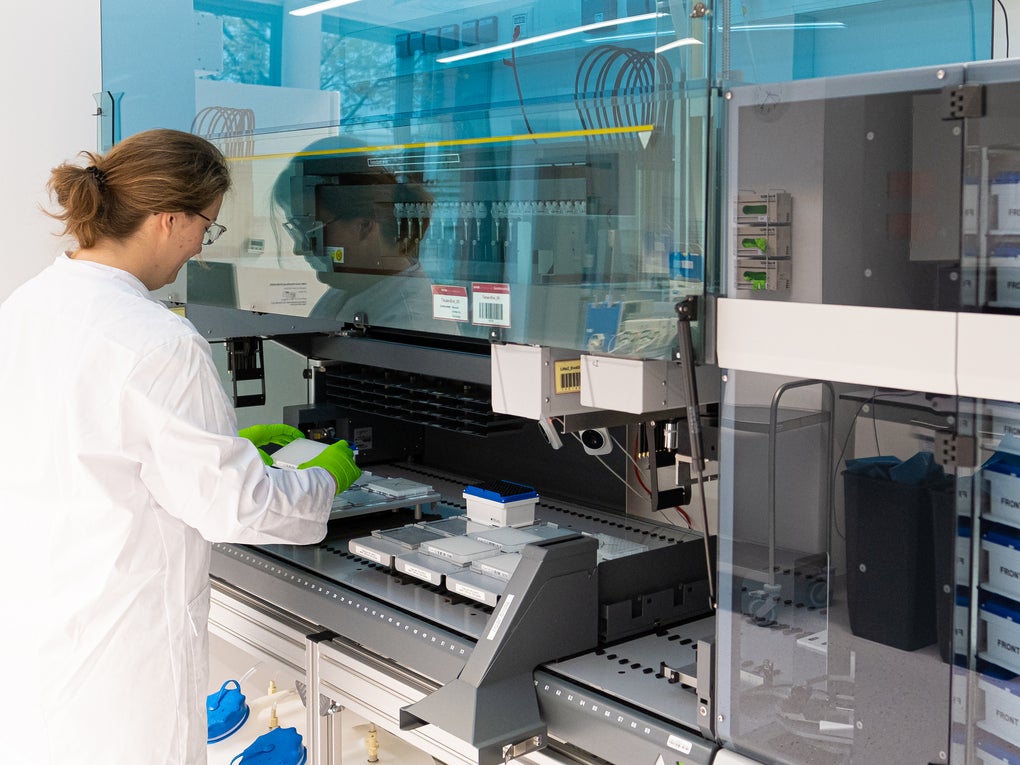
DKMS Life Science Lab has discovered almost 6,000 "new" HLA characteristics since 2010
Our DKMS Life Science Lab (LSL), the world's leading HLA typing laboratory, analyzes around 1.2 million samples of potential hematopoietic stem cell donors every year. It makes an important contribution to medical research by optimizing the search for donors. Our typing specialists have discovered almost 6,000 previously unknown HLA gene variants (alleles) and made them available to the international HLA allele database. This benefits physicians and their patients worldwide.
We place particular emphasis on the high typing quality of all registered donors. Currently, our typing profile includes twelve HLA gene loci with 24 high-resolution tissue characteristics, as well as other relevant criteria for donor selection, such as CMV status, blood group (ABO and RhD) and KIR receptor group. 170 laboratory staff process more than one million buccal swab samples from newly registered stem cell donors per year. With the adaption of the NGS (Next Generation Sequencing) method, for example, we have been able to increase the number of processed samples to well over one million per year! This is possible with the help of Next Generation Sequencing (NGS).
New HLA alleles found in more than 34,500 cases
Our specialists keep discovering "new", previously unseen alleles. A special department at our lab is dedicated to the in-depth analysis of these new alleles and thus makes a decisive contribution to the further development of the international HLA reference database for allele sequences (IPD-IMGT/HLA database). This database provides public access to the sequencing information of all known alleles and serves as a reference for all laboratories, clinics and research institutions worldwide that perform HLA typing.
Since 2010, our experts have found new HLA alleles in more than 34,500 cases (as of April 2021). Since then, they have submitted 5,848 new alleles to the international database. Of these, 3,407 have received their own name to date and have been officially added to the reference database. From this point on, the search for a matching donor with such an allele has only become possible.
Two sequencing methods for maximum safety
If the typing process reveals that a gene variant is not yet known in the international reference database, it is completely sequenced again. Our experts use two different sequencing methods (NGS and PacBio) to completely exclude sequencing errors. The release of the IPD-IMGT/HLA database contained a total of 27,059 HLA alleles at the end of 2020. Of these, only 44% (11,845 alleles) were fully characterized. Nearly one-third (29%) of the fully characterized alleles were disclosed by our lab. This number is increasing daily as our lab is pursuing further projects to expand the international reference database. The focus is on genes that are particularly challenging due to their length or structure and are therefore only fragmentarily represented in the database. Currently, the laboratory is working on the characterization of alleles of the genes HLA-DQB1, HLA-DRB3, HLA-DRB4, HLA-DRB5, HLA-DMA, HLA-DMB, HLA-DOA, MICA and MICB. In addition to previously unknown alleles, alleles that have only been partially described in the database are also characterized. In this way, our DKMS Life Science Lab makes a significant contribution to the permanent improvement of the reference database and thus supports the important work of all clinics, research institutions and laboratories that access it.